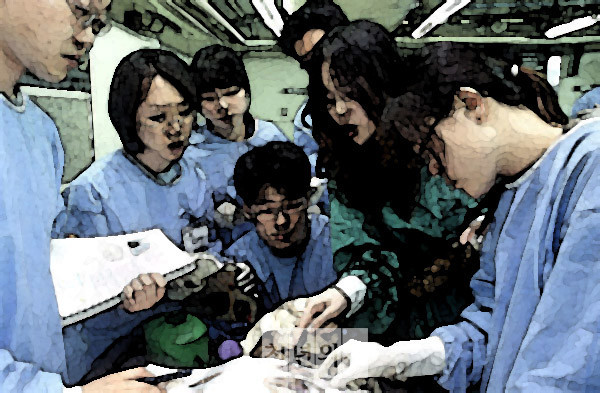Surgery departments are seriously worried that it could be more difficult than ever to recruit interns for surgery residency in 2022.
Surgeons have divided opinions over how the mandatory surveillance cameras in operating rooms (OR) and shortened surgery training period from four to three years affected interns’ interest in surgery.

However, they all agree that the surgery department is in crisis to persuade interns to pick surgery as a career.
A surgeon at a university hospital in a provincial area said even the five largest hospitals in Seoul would face difficulty recruiting surgery trainees this year. If the “Big Five” hospitals in Seoul struggle, hospitals in the greater Seoul area will struggle more, and those in provincial areas struggle the most, she said.
Another surgeon at a university hospital in the greater Seoul area said there was no clear solution to stopping interns from avoiding the surgery department.
“This will get worse. Even when recruitment is imminent, it isn’t easy to find applicants for surgery. Unless you’re one of the Big Five, the situation is quite similar anywhere you go,” he said.
He said he did not think the mandatory installation of CCTVs in the OR would significantly affect interns’ decision to apply for the surgery department.
“Many large, tertiary hospitals have been already operating CCTVs in operating rooms. Therefore, it is unlikely that a problem would occur as the medical community had warned,” he added.
However, residents said the impact of the CCTVs in the OR would be greater than expected.
They told Korea Biomedical Review that interns and medical school students seemed overwhelmed by the parliament’s approval of the bill to mandate surveillance cameras in the OR.
This could potentially discourage interns from applying for the surgery department, they said.
A surgery resident at a university hospital in the Seoul metropolitan area said the CCTVs in OR could be more burdensome for interns and med students than surgeons who have much experience in surgery and patient care.
“Interns are very afraid of a situation where they could be sued due to an unavoidable issue or being blamed for their action,” she said. “Regardless of whether the law of mandating surveillance cameras in OR is ‘evil’ or not, interns seem to be worried about the increased chance of conflicts with patients and guardians.”
Another resident at a university hospital in a provincial city said professors at the surgery department encouraged interns to choose surgery. Still, the mandatory CCTVs in OR made it difficult to turn the tide.
“Surgery training is tough, but the so-called ‘CCTV law’ became one more reason not to apply for surgery department,” he said. “This is a separate matter from how residents are satisfied with the surgery department now. Residents also worry that surgery would have few applicants this year.”
However, there is almost no fix to reverse the trend of avoiding the surgery department.
President Yeo Han-sol of the Korean Intern Resident Association (KIRA) said the shortage of applicants for the surgery department had been repeatedly pointed out. Still, the medical community has failed to draw up a feasible solution.
“The effect of giving financial advantages such as raising the salary for surgery trainees will have a limit in nurturing surgeons. Therefore, we should find a fundamental and complicated cause of the problem, rather than simply blaming the CCTV law,” Yeo said.
The surgeon at a university hospital in the greater Seoul area, mentioned above in the article, said reducing the surgery training period from four to three years worsened the crisis in the surgery department in provincial areas.
“After the period reduction, interns started to think that surgery residency in areas other than Seoul could give them a disadvantage in getting fellowship,” he said. “Not only residents but fellows could prefer working in Seoul only.”
Korean Surgical Society Chairman Lee Woo-yong said the shortening the surgery training period to three years would help encourage interns to choose surgery.
However, an increase in application for the fellowship will lead to the concentration of manpower in large hospitals, making it difficult for small hospitals or those in provincial areas. Thus, there is no silver bullet to make surgery appealing to interns, he said.
He added that the CCTV law would also have a significant impact on small hospitals rather than large ones.

